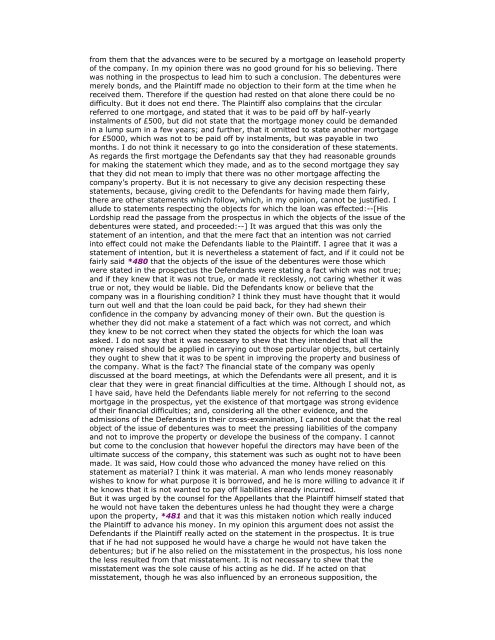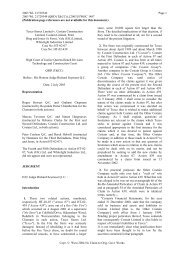Edington v Fitzmaurice - Thomson Reuters
Edington v Fitzmaurice - Thomson Reuters
Edington v Fitzmaurice - Thomson Reuters
You also want an ePaper? Increase the reach of your titles
YUMPU automatically turns print PDFs into web optimized ePapers that Google loves.
from them that the advances were to be secured by a mortgage on leasehold propertyof the company. In my opinion there was no good ground for his so believing. Therewas nothing in the prospectus to lead him to such a conclusion. The debentures weremerely bonds, and the Plaintiff made no objection to their form at the time when hereceived them. Therefore if the question had rested on that alone there could be nodifficulty. But it does not end there. The Plaintiff also complains that the circularreferred to one mortgage, and stated that it was to be paid off by half-yearlyinstalments of £500, but did not state that the mortgage money could be demandedin a lump sum in a few years; and further, that it omitted to state another mortgagefor £5000, which was not to be paid off by instalments, but was payable in twomonths. I do not think it necessary to go into the consideration of these statements.As regards the first mortgage the Defendants say that they had reasonable groundsfor making the statement which they made, and as to the second mortgage they saythat they did not mean to imply that there was no other mortgage affecting thecompany's property. But it is not necessary to give any decision respecting thesestatements, because, giving credit to the Defendants for having made them fairly,there are other statements which follow, which, in my opinion, cannot be justified. Iallude to statements respecting the objects for which the loan was effected:--[HisLordship read the passage from the prospectus in which the objects of the issue of thedebentures were stated, and proceeded:--] It was argued that this was only thestatement of an intention, and that the mere fact that an intention was not carriedinto effect could not make the Defendants liable to the Plaintiff. I agree that it was astatement of intention, but it is nevertheless a statement of fact, and if it could not befairly said *480 that the objects of the issue of the debentures were those whichwere stated in the prospectus the Defendants were stating a fact which was not true;and if they knew that it was not true, or made it recklessly, not caring whether it wastrue or not, they would be liable. Did the Defendants know or believe that thecompany was in a flourishing condition? I think they must have thought that it wouldturn out well and that the loan could be paid back, for they had shewn theirconfidence in the company by advancing money of their own. But the question iswhether they did not make a statement of a fact which was not correct, and whichthey knew to be not correct when they stated the objects for which the loan wasasked. I do not say that it was necessary to shew that they intended that all themoney raised should be applied in carrying out those particular objects, but certainlythey ought to shew that it was to be spent in improving the property and business ofthe company. What is the fact? The financial state of the company was openlydiscussed at the board meetings, at which the Defendants were all present, and it isclear that they were in great financial difficulties at the time. Although I should not, asI have said, have held the Defendants liable merely for not referring to the secondmortgage in the prospectus, yet the existence of that mortgage was strong evidenceof their financial difficulties; and, considering all the other evidence, and theadmissions of the Defendants in their cross-examination, I cannot doubt that the realobject of the issue of debentures was to meet the pressing liabilities of the companyand not to improve the property or develope the business of the company. I cannotbut come to the conclusion that however hopeful the directors may have been of theultimate success of the company, this statement was such as ought not to have beenmade. It was said, How could those who advanced the money have relied on thisstatement as material? I think it was material. A man who lends money reasonablywishes to know for what purpose it is borrowed, and he is more willing to advance it ifhe knows that it is not wanted to pay off liabilities already incurred.But it was urged by the counsel for the Appellants that the Plaintiff himself stated thathe would not have taken the debentures unless he had thought they were a chargeupon the property, *481 and that it was this mistaken notion which really inducedthe Plaintiff to advance his money. In my opinion this argument does not assist theDefendants if the Plaintiff really acted on the statement in the prospectus. It is truethat if he had not supposed he would have a charge he would not have taken thedebentures; but if he also relied on the misstatement in the prospectus, his loss nonethe less resulted from that misstatement. It is not necessary to shew that themisstatement was the sole cause of his acting as he did. If he acted on thatmisstatement, though he was also influenced by an erroneous supposition, the
















